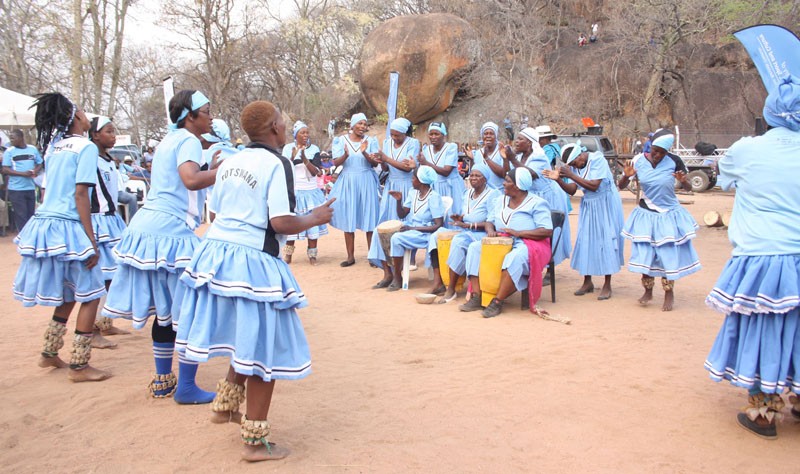Former High Court Judge slams govt
Lesedi Mkhutshwa | Tuesday October 4, 2016 14:45


He was addressing crowds, in a speech peppered with words like 'deliberate' and 'contempt' (on the part of government) at the annual Domboshaba cultural festival on October 1.
Mosojane was certainly in no mood to celebrate when he said 'the constitution of Botswana was deliberately and cynically crafted to treat Non-Tswana ethnicities with blatant partiality in their own land'. Mosojane said the provision of making Setswana the national language and the provision of listing only Tswana-speaking tribes as the principal tribes, without saying who the minor tribes were, is a further testimony to the lopsided nature of the constitution.
He said it is worth noting that nearly all of the excluded ethnicities are indigenous to Botswana and were in fact here before the Tswana tribes arrived in this country.
'The intention is to completely to eclipse and slowly render them (non-Tswana-speaking tribes) non-existent,' he bristled.
Mosojane disclosed that the Bechuanaland People’s Party (BPP) then led by Phillip Matante strongly opposed these discriminatory provisions both at the Marlborough House (in the UK) and thereafter in Parliament, but he lost each time because of the numbers.
Mosojane, who is the husband of Margaret Mosojane, a former president of Tatitown Costomary court and a long-time social activist, said the only democracy that there is in this country is found at the polls and nowhere else.
At the core of Mosojane's contention was that because of these machinations by the government, Bakalanga have lost focus on bringin the Kalanga language back to school.
“Any of you here who went to school before 1972 will know that Kalanga was taught until it was stopped that year by the current government, rather high handedly with a great deal of contempt. Sir Seretse Khama, the first president of independent Botswana, addressed kgotla meetings in our villages giving unconvincing reasons why his government had found it necessary to stop the teaching of Kalanga in our schools,” he said. Mosojane added that despite the fact that people opposed the decision by the government, they went ahead and abolished the teaching of Kalanga language in schools. He disclosed that when he started school at Masunga in the 1950’s, he learnt the five vowels, how to write, count and the alphabets in Kalanga.
“Throughout the first three or four years of primary school education, we were taught everything in Kalanga, interchangeably with English language. Thereafter English language took over. My children, your children, some of you here, your brothers and sisters not here have missed this opportunity. Clearly we were more equal in this country under Bechuanaland than under Botswana today,” he said. When giving words of motivation to the attendants, Mosojane said the organisers and attendants should have a renewed sense of energy and confidence, with more courage and less fear and feeling much stronger with a determination in preserving the Kalanga culture. He said the worrisome fact is that whenever the issue of the teaching other languages arose in Parliament, it is their own Kalanga Members of Parliament (MPs) who becomes front liners in opposing the motion.
“Their argument is always that such move would divide the nation, but they do not say how. Moreover, of late MPs address political rallies and kgotla meetings in their respective constituencies which are Kalanga speaking in Setswana to comply with the policies of the ruling party. You will be aware that your children get flogged or punished in some other way for speaking their language within the school grounds,” he alleged, but Mmegi could not independetly verify this..
He disclosed that in some churches in their respect areas, sermons are delivered in either Setswana or in English. Mosojane indicated that language is the people’s heritage and without it one has no identity and character. He said Botswana should benchmark from neighbouring countries such as South Africa, Namibia, Zimbabwe, Zambia and others where all languages are of equal importance irrespective of size. “No ethnic group or language was at independence in those countries elevated above from others despite the presence of clear majorities and widely spoken languages. No language is imposed on others but people are encouraged to learn as many languages, which is a healthy policy in a plural society,” he said.
Howevever, Domboshaba continued where it left off last year and the past decade, after it was established in 2000, celebrating the Kalanga culture. The event was held in Domboshaba, just a few kilometres from Vukwi and Kalakamati villages. The Festival aims to preserve Kalanga language and heritage as aptly encapsulated in the theme of the day, ‘Teaching of mother tongue a critical approach to sustainable development’.
Bana bana ba Ntogwa, Bakani Tjilenje and other Kalanga groups were the toast of the ocassion with Ikalanga dances such as hosanna, hoso, mokomoto and others. Other traditional groups who mesmerised the attendants included Honey Polka Group from Kanye and a Seperu group from Kasane. Guests were also treated to mouth-watering Kalanga traditional cuisines of nlibo we nyemba, chimune, delele, mashonja, seswaa, dobi, tjarobe tje ngombe kgomo, mathunde, among others. The Ministry of Youth Rmpowerment, Sport and Culture Development and Duma FM, sponsored the event.
